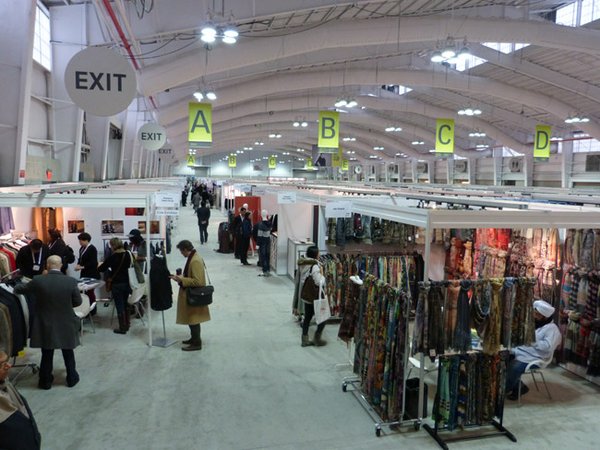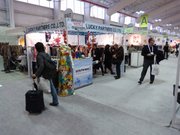LET IT SNOW: While snow fell outside, fabric buyers, designers and sourcing executives scouted for new textile, trim and sourcing resources at Texworld USA and the International Apparel Sourcing Show in the North Hall of the Jacob K. Javits Convention Center in New York.
TEXWORLD USA
Texworld USA Draws a Crowd Amid Snowy Weather
NEW YORK—New York saw more than a foot of snowfall on opening day of the Jan. 20–23 run of Texworld USA, held in the North Hall of the Jacob K. Javits Convention Center.
Despite the inclement weather, clusters of designers and piece-goods buyers navigated the aisles of the show looking for new textile, trim and sourcing resources amid the 260 exhibitors showing at Texworld USA and the International Apparel Sourcing Show.
“It’s quite busy—it was a bit of a surprise,” said Riccardo Ferrari, chief executive officer of Hong Kong trim supplier Ulisse China Ltd., on opening day of the show. “The people we’ve been talking to are quite positive—even though the weather outside is so bad.”
Ulisse was showing several new groups, including a Steampunk-inspired collection and several items designed for denim collections. Some of the new items include natural fiber trim made with cork and embossed leather in the shape of pyramid studs.
At the Buhler Quality Yarns booth, David Sasso, vice president of international sales, and Victor Almeida, technical, sale and product development, met with smaller companies on the first day of the show.
“We use that to do more education, talking about using the network to help people source,” Sasso said.
Based in Jefferson, Ga., Buhler manufactures higher-end yarns using Supima cotton, Tencel and MicroModal.
By the second day of the show, business had picked up further.
“It’s been really busy,” said Tom McCall, director of business development for Tuscarora, a spinning mill in Mt. Pleasant, N.C.
“We have a lot of retailers here. We had Belk [department store]. We have got vertical people like Fruit of the Loom, which is exciting for us. We’re seeing a lot of enthusiasm for reshoring or ‘Made in America.’”
Warren Zaretsky, vice president of sales for the Mansfield knitting mill in Los Angeles, agreed.
“Production is definitely coming back,” he said. “When people can rely on a domestic company that ships on time, they can get reorders in three to four weeks’ time. [Even] if their orders are getting smaller, it’s big for me. Instead of 100,000 [units produced offshore], they cut 30,000 [domestically].”
What’s new now?
Zaretsky was at the show with several new developments, including new French terry, new textured fabrics, new Tencel and Modal fabrics for yogawear, and new stripes.
“Everybody is coming to me with stripes,” he said. “Our pricing is really sharp, really competitive.”
Mansfield had a good year in 2013, Zaretsky said. “Brands are saying their business is getting better,” he said. “Accounts are doubling orders.”
The company recently purchased three new jacquard machines, he added.
At the Mozartex booth, Mozart Teng, president of the Jiangsu, China–based company, was showing several new products, including super-lightweight 3.2-ounce Tencel denim and foil-printed Tencel denim. Mozartex works with brands such as Bebe, Guess, Tommy Bahama, Levi’s, Ella Moss, Gap and Bella Dahl.
Teng has also developed a line of digitally printed Tencel fabrics and high-density Tencel-blend fabrics for outerwear. “You can pass the rain test,” he said.
Portuguese knit mill Crispim Abreu was showing ultra-lightweight linens and Modal and Tencel blends.
Buhler’s Sasso said interest in air jet spinning is growing, as is interest in cationic yarns such as Buhler’s Rainbow.
“It’s not new, but it provides the speed the supply chain needs,” he said.
Tuscarora was showing a number of samples made from its Protura cationic yarns, including a purple denim made with Protura in the warp. “In the dye bath, all the dye goes to the warp yarn,” McCall said.
The benefit is a company can invest in one base fabric and dye in small batches as orders come in.
“Rather than dye 20,000 yards, you can do as little as 2 yards,” McCall said.
McCall was also showing a cotton duck with Protura warp yarn.
“It works in any dye process,” he said. “We dyed these in about 30 minutes.”
Another development at Tuscarora included a soft knit made with polyester blended with Crailar flax and then enzyme treated to remove the surface fiber.
“Everybody thinks of flax as scratchy,” McCall said. “You would never wear flax next to the skin. With this [Crailar flax] fiber, the hand takes it to the next level.”
The spinner recently worked with department-store chain Belk on its Red Camel private brand, which uses Tuscarora’s Gnarly cotton yarn.
“Being able to reach out to retailers helps us understand what their customers want,” McCall said.
Buhler, Mansfield, Mozartex and Tuscarora all showed in the Lenzing Innovation Pavilion, which included 23 mills from around the world, including four from the United States.
On the horizon
Among the education offerings at Texworld was a seminar on new sustainable developments for denim with a panel of experts from Lenzing, Cotton Inc. and DyStar.
Two years ago, Cotton Inc. formed a partnership with Spanish technology company Jeanologia, which manufactures laser finish machines that reproduce the look of a washing without water.
The partnership was formed as part of an initiative to find more environmentally friendly processes for denim finishing, said Mark Messura, Cotton Inc.’s senior vice president, global supply chain.
Cotton Inc. is also one of the founding organizations in Cotton Leads, a program formed with industry organizations in the U.S. and Australia that promotes sustainability and traceability throughout the cotton supply chain.
Michael Kininmonth, Lenzing denim project manager, noted that more and more denim brands are creating sustainability departments.
Lenzing’s Tencel and Modal fibers are made with cellulose from sustainably harvested eucalyptus and beechwood trees.
“With Tencel, we’re just a baby. It’s only been 20 years in the market,” Kininmonth said, noting that polyester and Lycra have both been in the market since the 1950s.
Howard Malpass, a tech rep for DyStar, discussed the challenges of dyeing with indigo, which gives denim a “unique,” long-lasting, “purer shade of blue” than other dyes.
“The key issue is the discharge of water,” he said. “With indigo, the salt cannot be removed without great expense. [But DyStar’s Indigo Solution, a pre-reduced indigo] cuts the salt in half.”
























